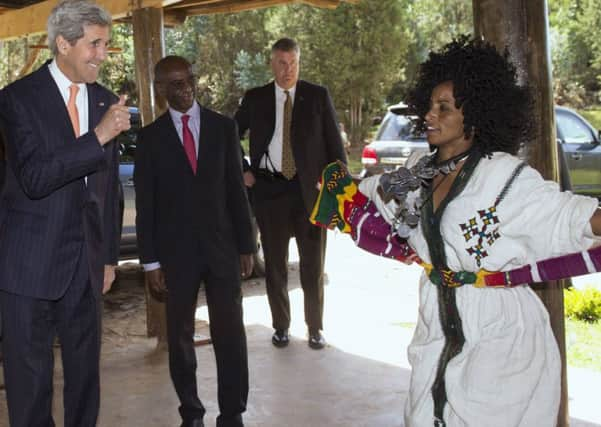US ready to invest in ‘more secure’ Africa


He called for an expansion of American investment in Africa as he highlighted recent developments which led to a number of US companies, including IBM, Microsoft and Google, spending more than $100 million on projects across the continent.
In an Africa policy address to members of the Addis Ababa diplomatic corps in Ethiopia and the Young African Leaders network, Kerry also highlighted ongoing crises in Nigeria, South Sudan, Somalia and the Central African Republic and urged people across Africa to demand stability in their countries and seek financial development.
Advertisement
Hide AdAdvertisement
Hide AdSpeaking at a mountain-top auditorium outside Addis Ababa, Kerry said: “This is clearly a moment of opportunity for all Africans. It is also a moment of decision.”
Africa has the natural resources, capacity and the “know-how” for economic development, Kerry said, adding that the US is the continent’s “natural partner”.
He said that, over the next three years, 37 of the 54 African nations will hold national elections, with millions of voters going to the polls to elect people with the potential to change their lives for the better.
And he called on Africans to combat the political corruption that the African Union says has to date cost the people of Africa tens of billions of dollars in lost investment.
“That money could build new schools and hospitals, new roads and bridges, new pipes and power lines. That’s why it’s a responsibility for citizens in Africa and in all nations to demand that public money is providing services for all, not lining the pockets of a few,” Kerry said.
Combating corruption, he said, “lifts more than a government’s balance sheet”.
But Kerry warned that “a new Africa” cannot emerge without becoming “a more secure Africa”.
“In too many parts of the continent, a lack of security, the threat of violence, or all-out war prevent even the first shoots of prosperity from emerging. The burdens of past divisions might never be completely eliminated but they must never be allowed to bury the future,” he said.
Advertisement
Hide AdAdvertisement
Hide AdKerry also warned of the dangers of climate change, noting that, according to a recent UN report, parts of Mombasa, Dakar, Monrovia and dozens of coastal African cities could be underwater by the middle of the century.
“Africa has 60 per cent of the world’s arable land. That is a tremendous opportunity for the future, not just to feed Africa’s people but to feed the world,” he said.
But because of climate change and global warming, yields from rain-fed agriculture in parts of Africa could decline by half, he warned.
“When 97 per cent of scientists agree that the climate is changing, that it is happening faster than they even predicted, and that humans are the significant cause, let me tell you something: we need to listen. We need to act,” he said.
Earlier it emerged that South Sudan’s president has agreed to hold direct talks to end the conflict in the country with his rival.
Kerry said the meeting between president Salva Kiir and rebel leader Riek Machar could take place as early as this week.
More than a million people have fled their homes in the area since December.
Fighting broke out after Kiir accused his sacked deputy, Machar, of plotting a coup. Machar denied the charges but then mobilised a rebel force to fight the government.
Advertisement
Hide AdAdvertisement
Hide AdTheir power struggle has taken on an ethnic dimension, as politicians’ political bases are often ethnic.
The two sides negotiated a truce in January and have resumed talks in Ethiopia, but the violence has continued.
Kerry warned that if the fighting continues to target civilians along ethnic lines it “could really present a very serious challenge to the international community with respect to the question of genocide”.